‘Building the Wall’: Staging America’s Worst Immigration Nightmare
Playwright Robert Schenkkan sounds the alarm about a scenario he says “absolutely” could come to pass in the United States.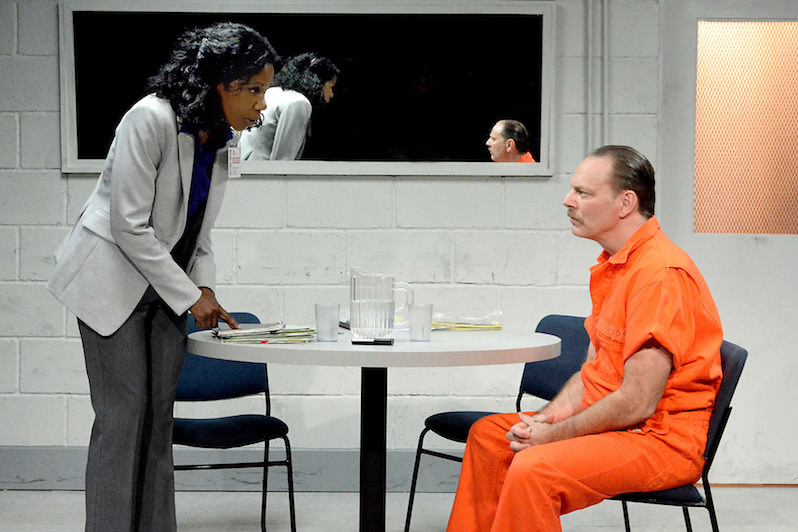
Judith Moreland and Bo Foxworth star in the Los Angeles production of Robert Schenkkan’s “Building the Wall.” (Ed Krieger)
As the 2016 presidential campaign rolled to a close, prize-winning playwright Robert Schenkkan was disgusted by the diminished standards that had come to define the electoral process.
“I felt that regardless of who got elected, lines had been crossed, and those historical agreements, spoken and unspoken, about our two-party system, had been irretrievably damaged over the course of the election,” Schenkkan told Truthdig. “[There was] a coarsening of public discourse, the elimination of even a modicum of respect. And reasoned debate had been tossed in favor of a carnival-like click-bait.”
Schenkkan’s disgust inspired his new play, “Building the Wall,” which he wrote during seven feverish days in late October. The play currently is running at The Fountain Theatre in Hollywood and will roll out across the country in coming weeks.
Set in 2019, the play takes place entirely in a prison interview room where Gloria, a historian, interviews Rick, an inmate, about the circumstances leading to his arrest. (In the Los Angeles production, Gloria is played by Judith Moreland and Rick by Bo Foxworth.
Rick had worked in a private prison when, following a dirty bomb attack in Times Square, martial law was declared and “illegals” were rounded up for deportation. The facility where he worked was meant not for housing detainees, but for holding them until they could be repatriated to their home countries. When those countries refused to take them back, the prison population began to overflow, straining maintenance and medical services. A cholera outbreak left Rick and other administrators with the overwhelming task of disposing of the dead. From there, things got worse. In Rick’s tale, we see how an average guy could get caught in a gradual downward spiral, ending with a situation that resembles Hitler’s “final solution.”
“Absolutely it can happen here [in the United States],” Schenkkan said. “We have a complicated history as it is, in terms of our treatment of minorities, our treatment of American Indians and … our treatment of immigrants.”
His writing a 90-minute play over the course of one week not only suggests Schenkkan’s passion for the subject but also an urgency for theater to respond to a news cycle that moves at blinding speed. “We cannot do theater the way we used to,” the playwright said. “It’s not a business-as-usual world. We have to respond much more quickly.”
That’s where Nan Barnett came in. As executive director of the National New Play Network, she represents an alliance of 110 nonprofit theaters nationwide. Barnett was enthusiastic about “Building the Wall”—“I’ve been calling this Robert’s ‘indictment and incitement’ play,” she told Truthdig—and she arranged for it to appear throughout the country.
Barnett and Schenkkan say the play has a “rolling premiere.” It runs through May 21 in Hollywood, begins April 4 at Denver’s The Curious Theater and begins April 30 in Washington, D.C. In coming months, it also will open in cities including Miami, Santa Fe, N.M., and Tucson, Ariz. It’s not a usual premiere because it will be playing simultaneously in numerous venues with different casts and directors. Schenkkan will visit each venue and offer advice, refining the play as he goes.
Schenkkan won the 1992 Pulitzer Prize for his collection of one-act plays, “The Kentucky Cycle,” and a Tony Award in 2014 for “All the Way,” starring Bryan Cranston as President Lyndon Johnson. The writer also was nominated for an Oscar for “Hacksaw Ridge” earlier this year.
He sees “Building the Wall” as a “call to action” but isn’t blind to the fact that liberals likely will be his core audience. So to cast a wider net, he made licensing rights available to any theater company that cares to produce the play. As a result, he is swamped with requests from companies in the United States and other countries.
Schenkkan feels the eager response could be emblematic of an emerging activist trend in theater and in other art forms. Before President Trump’s election in January, The Ghostlight Project brought people out for peaceful protests at 300 theaters in 42 states. In London, Theatre503 commissioned “Top Trumps,” a series of short plays dealing with President Trump’s election. On April 18, ARULA (Artists Rise Up Los Angeles) is planning a night of comedy, “Transparency, Taxes & Tweets,” as a fundraiser for the Southern Poverty Law Center.
Barnett sees this pattern emerging in the number of submissions to the National New Play Network, which means there could be many such shows in the future. Or maybe not, if President Trump’s proposed elimination of the National Endowment for the Arts (NEA) and the National Endowment for the Humanities takes place.Barnett’s organization is funded partially by the NEA, as are many theaters in the network. “Will it stop us from doing the work? No,” Barnett said, matter-of-factly. “Will it stop us from doing this type of work? Absolutely not.”
For Schenkkan, the arts community has an obligation to respond to what he calls a “political crisis.”
“In this instance, the very foundational values of our 200-year-old republic are under conscious attack,” he said, explaining how the 2010 Citizens United ruling and gerrymandering, among other developments, threaten the very root of democracy.
“The most important thing that people can do right now is to become very conscious of what is going on, and not normalize what is not normal,” Schenkkan said. “It’s important because ideology cannot be converted into legislation, and [in]to practical socio-political consequences, unless the population acquiesces. If they don’t, if they resist, as we have seen, that won’t happen.”
Despite the concerns expressed in “Building the Wall,” Schenkkan sounded surprisingly optimistic. “In order to avoid the kind of unpleasant scenarios that could result out of this current crisis, one of which I’ve outlined here, people need to make conscious decisions, moral decisions,” he said.
Independent journalism is under threat and overshadowed by heavily funded mainstream media.
You can help level the playing field. Become a member.
Your tax-deductible contribution keeps us digging beneath the headlines to give you thought-provoking, investigative reporting and analysis that unearths what's really happening- without compromise.
Give today to support our courageous, independent journalists.
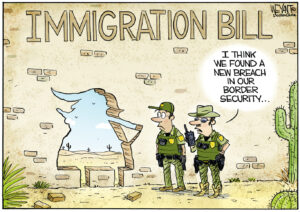
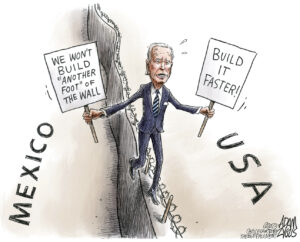
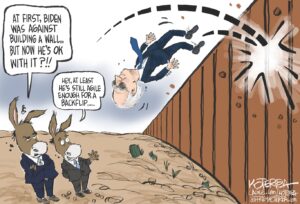
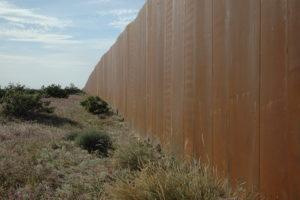
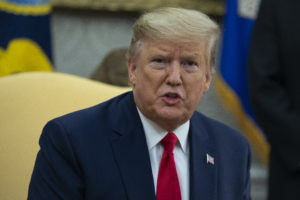
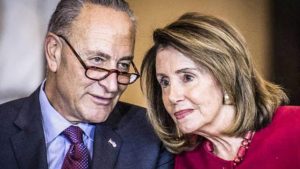
You need to be a supporter to comment.
There are currently no responses to this article.
Be the first to respond.